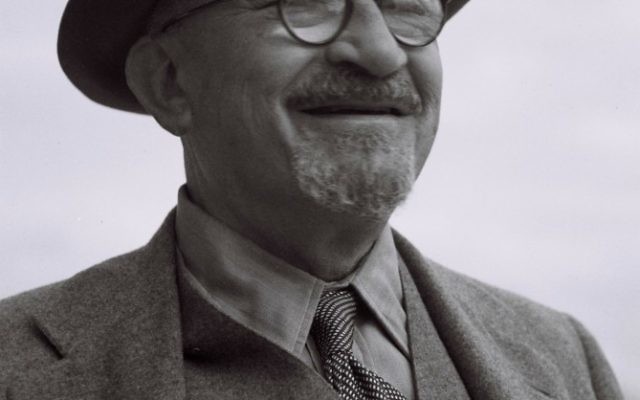Weizmann Alters World One Discovery at a Time
By Tova Norman
Although Chaim Weizmann is well-known as the first president of Israel, his life as a scientist may be even more significant to the founding of the state.
About 50 people gathered at Congregation B’nai Torah on Thursday, July 28, to hear about the Weizmann Institute of Science, the science research institute in Rehovot, Israel, that Weizmann founded and where he worked and lived until his death.

Chaim Weizmann, shown in 1949, was a scientist long before becoming Israel’s first president.
The story of Weizmann’s scientific contributions during World War I — discovering a method of industrial fermentation to produce large quantities of acetone important to the British war effort and befriending Arthur Balfour of the Balfour Declaration — was the first of many things that garnered reactions of awe from the audience.
Mark Kotler, the executive director, leadership giving, for the American Committee for the Weizmann Institute of Science (www.weizmann-usa.org), continued to wow the audience with a presentation about the discoveries made by scientists at the Weizmann Institute.
“These breakthroughs are leading to inventions that improve human life on our planet,” Kotler said, a statement that reflects the Weizmann Institute’s motto: “Science for the benefit of humanity.”
“Five out of the top 25 prescription drugs have their roots in Weizmann science,” Kotler said. “No one can claim so many drugs in the top sellers in the world.”
He went on to explain some of the discoveries and contributions of Weizmann scientists.
They have two treatments in clinical studies in the United States that are having high success rates treating cancer.
They have created hybrid crops that produce more protein and require less water to help provide “a secure and abundant food source for the world.”
They are working on a flu vaccine that uses a new method to destroy the virus so that it could kill a variety of strains and last up to 10 years.
They have devised a sniff test to predict autism in babies with over 80 percent accuracy, enabling early diagnosis and intervention.
They have discovered that each person’s individual microbiome and genetics affect metabolism, leading to encouragement for people to create tailor-made nutrition plans.
They have been able to create stem cells from skin cells with a 100 percent success rate in less than one week, with possible implications for scientists around the world.
They have been able to regenerate heart tissue for patients who have damaged hearts from heart attacks.
They have discovered the structure and function of the ribosome, which could lead to new antibiotics against superbugs and made Professor Ada Yonath the first Israeli woman to win a Nobel Prize in 2009.
They have used alternative energy to create streetlights for developing countries.
The list went on.
Kotler explained that the prolific and impactful research of the Weizmann Institute results from seeking out and hiring the best people and giving them the freedom to research what interests them. Collaborative projects between Weizmann scientists and other scientists around the world are also an important factor.
He said the philosophy at Weizmann is “to hire the most brilliant and courageous scientists nationwide and allow them to follow their curiosity where it takes them.”
Tal Nudelman, a native Israeli and the Israel advocacy chair on the board at B’nai Torah, invited Kotler to speak after hearing a presentation from him in November.
“Our mission is to increase action and awareness of Israel in our congregation through speakers and cultural engagements,” he said.
Nudelman was impressed that the discoveries Kotler highlighted in Sandy Springs were completely different from the last presentation he saw.
The focus when discussing Israel is often on politics and security, Nudelman said, but hearing about a different side of Israel is important.
“We don’t talk enough about the marvels in technology,” he said. “It’s just an aspect of the country that needs to be promoted so people can see how important Israel is to the world.”
The Weizmann Institute’s discoveries are only a part of its influence.
The Feinberg Graduate School, where all classes are taught in English, accepts applicants from around the world for doctoral and master’s programs. The fellowship program is free for students.
The institute also has programs for high school students and undergraduate students to explore research with scientists in the areas of their choice.
The Davidson Institute branch of Weizmann runs science, math and technology educational programs for children across Israel.
In the end, Kotler encouraged participants to find out more about Weizmann and choose research they might be interested in supporting. He said current programs are funded through the Israeli government, scientific grants and private donations, and funding could be used to create new programs. He also invited Atlantans to put Weizmann on the itinerary of their next trip to Israel.




comments